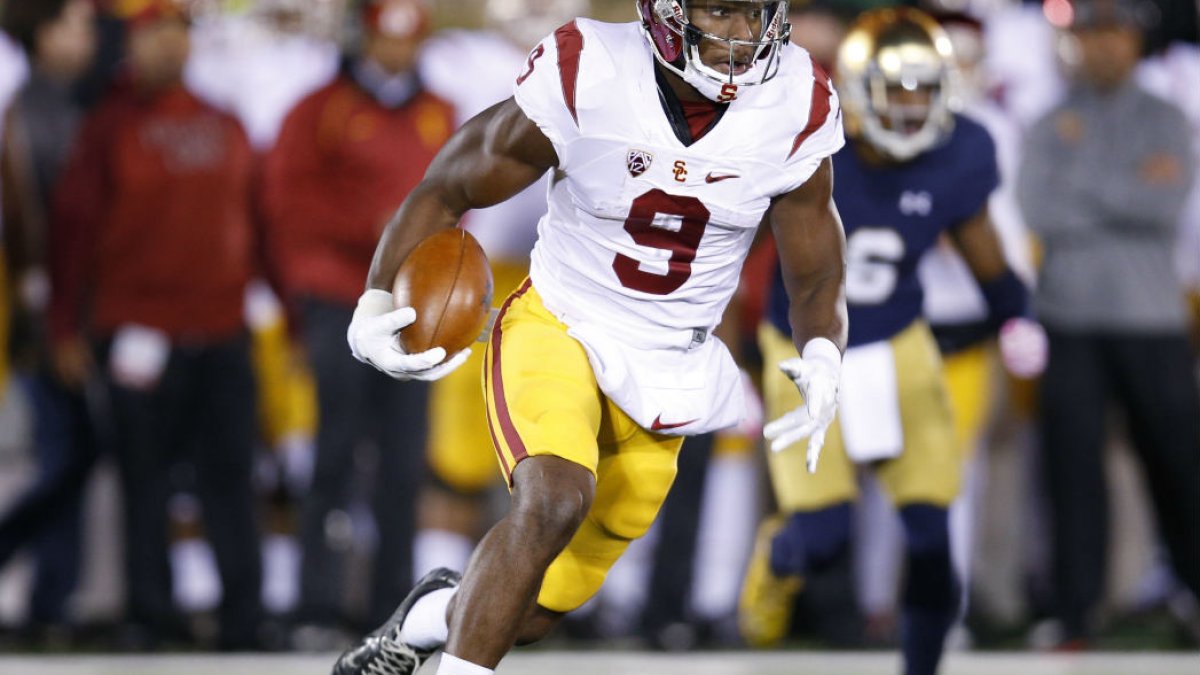The premier Pac-12 matchup this week is between the Stanford Cardinal and the USC Trojans on Saturday night. Both of these teams feature tremendous open-field weapons in Stanford RB Christian McCaffrey and USC WR JuJu Smith-Schuster who can create big plays for their offenses.
Smith-Schuster is a pure wide receiver for the Trojans who only rarely gets rushing opportunities, while McCaffrey is Stanford’s lead running back who is also frequently used in the Cardinal passing game. Smith-Schuster (6-foot-2, 210 pounds) is bigger than McCaffrey (6-0, 200), has a more linear frame and has a longer stride to help him cover ground quickly. McCaffrey is built like a running back but has the movement ability of a slot wide receiver, with very quick feet and change-of-direction skills that are quicker and cleaner than Smith-Schuster.
We took a look at our PFF grades and stats from last year as well as the start of the 2016 campaign to determine which one of these guys is the better playmaker, and came away with the conclusion that McCaffrey edges Smith-Schuster. Let’s take a look at the three reasons why:
1. McCaffrey actually forced more missed tackles as a receiver last year
In 2015, Smith-Schuster caught 89 passes and forced 12 missed tackles – equivalent to 0.13 missed tackles forced per catch. McCaffrey caught 45 passes and forced 14 missed tackles, or 0.31 missed tackle forced per catch.
Smith-Schuster is without question a tough player to bring down in the open field, given his rare size and speed combination for a receiver, but McCaffrey’s ability to take screens and other short passes and turn them into big gains is second to none in college football. In his one game so far this season, against Kansas State, he forced three missed tackles on seven catches, producing 20 yards after the catch. Through two games of 2016, Smith-Schuster has forced two missed tackles on eight catches, with 40 yards coming after the catch.
2. McCaffrey’s yards after the catch average is crazy good
In 2015, Smith-Schuster had 594 yards after the catch, which was good for 6.67 yards per reception. McCaffrey had 592 yards after the catch on his 45 receptions, which was good for 13.2 yards per catch.
This isn’t a totally fair comparison, as the majority of McCaffrey’s pass targets are underneath throws that allow for him to create after the catch, whereas Smith-Schuster runs traditional receiver routes that often find him met by defenders at the catch point. But that 13.2 YAC/reception number from McCaffrey is nonetheless absurdly good, and indicative of just how dynamic an open-field threat he is. For reference, on wide receiver screens alone the past two years, Smith-Schuster averaged 11.8 yards after catch per reception.
So McCaffrey still has the advantage here. Even when you factor in total yards – but before and after the catch – McCaffrey came close to challenging Smith-Schuster for the Pac-12 lead in yards per route run average last year, at 3.20 to Smith-Schuster’s 3.39.
3. Smith-Schuster doesn’t provide the same value as a return man.
In 2015, Smith-Schuster returned four kicks for an average of 16.8 yards per return. McCaffrey had 37 kick returns and averaged 29.0 yards per kick return. Needless to say, this is a very small sample size we are dealing with, but aan offense starting a drive near the 30-yard line will have a much better chance of scoring than one that started at their own 17-yard line. McCaffrey also returned 14 punts, including one for a touchdown.
Bottom line
Smith-Schuster is one of the most dynamic open-field weapons in college football, and the Cardinal will have their hands full in trying to rein him in on Saturday night. But McCaffrey’s all-around elusiveness as a runner, receiver and return man make him one of the most difficult players to tackle in college football, and give him the edge in this head-to-head comparison.



 © 2024 PFF - all rights reserved.
© 2024 PFF - all rights reserved.